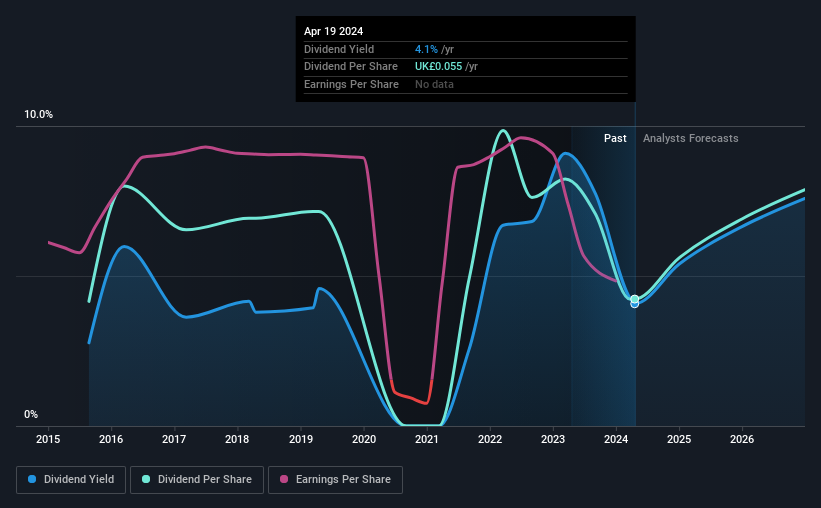
It looks like Eurocell plc (LON:ECEL) is about to go ex-dividend in the next four days. The ex-dividend date is one business day before a company's record date, which is the date on which the company determines which shareholders are entitled to receive a dividend. The ex-dividend date is an important date to be aware of as any purchase of the stock made on or after this date might mean a late settlement that doesn't show on the record date. Meaning, you will need to purchase Eurocell's shares before the 25th of April to receive the dividend, which will be paid on the 22nd of May.
The company's next dividend payment will be UK£0.035 per share, and in the last 12 months, the company paid a total of UK£0.055 per share. Looking at the last 12 months of distributions, Eurocell has a trailing yield of approximately 4.1% on its current stock price of UK£1.35. We love seeing companies pay a dividend, but it's also important to be sure that laying the golden eggs isn't going to kill our golden goose! We need to see whether the dividend is covered by earnings and if it's growing.
See our latest analysis for Eurocell
Dividends are typically paid from company earnings. If a company pays more in dividends than it earned in profit, then the dividend could be unsustainable. Eurocell paid out more than half (64%) of its earnings last year, which is a regular payout ratio for most companies. Yet cash flow is typically more important than profit for assessing dividend sustainability, so we should always check if the company generated enough cash to afford its dividend. What's good is that dividends were well covered by free cash flow, with the company paying out 24% of its cash flow last year.
It's encouraging to see that the dividend is covered by both profit and cash flow. This generally suggests the dividend is sustainable, as long as earnings don't drop precipitously.
Click here to see the company's payout ratio, plus analyst estimates of its future dividends.

Have Earnings And Dividends Been Growing?
Companies with falling earnings are riskier for dividend shareholders. If business enters a downturn and the dividend is cut, the company could see its value fall precipitously. Readers will understand then, why we're concerned to see Eurocell's earnings per share have dropped 15% a year over the past five years. Ultimately, when earnings per share decline, the size of the pie from which dividends can be paid, shrinks.
Many investors will assess a company's dividend performance by evaluating how much the dividend payments have changed over time. Eurocell's dividend payments are effectively flat on where they were nine years ago. When earnings are declining yet the dividends are flat, typically the company is either paying out a higher portion of its earnings, or paying out of cash or debt on the balance sheet, neither of which is ideal.
Final Takeaway
Has Eurocell got what it takes to maintain its dividend payments? We're not enthused by the declining earnings per share, although at least the company's payout ratio is within a reasonable range, meaning it may not be at imminent risk of a dividend cut. All things considered, we are not particularly enthused about Eurocell from a dividend perspective.
So if you want to do more digging on Eurocell, you'll find it worthwhile knowing the risks that this stock faces. To help with this, we've discovered 2 warning signs for Eurocell that you should be aware of before investing in their shares.
If you're in the market for strong dividend payers, we recommend checking our selection of top dividend stocks.
Valuation is complex, but we're here to simplify it.
Discover if Eurocell might be undervalued or overvalued with our detailed analysis, featuring fair value estimates, potential risks, dividends, insider trades, and its financial condition.
Access Free AnalysisHave feedback on this article? Concerned about the content? Get in touch with us directly. Alternatively, email editorial-team (at) simplywallst.com.
This article by Simply Wall St is general in nature. We provide commentary based on historical data and analyst forecasts only using an unbiased methodology and our articles are not intended to be financial advice. It does not constitute a recommendation to buy or sell any stock, and does not take account of your objectives, or your financial situation. We aim to bring you long-term focused analysis driven by fundamental data. Note that our analysis may not factor in the latest price-sensitive company announcements or qualitative material. Simply Wall St has no position in any stocks mentioned.
About LSE:ECEL
Eurocell
Engages in manufacture, distribution, and recycling of windows, doors, and roofline polyvinyl chloride (PVC) building products in the United Kingdom and the Republic of Ireland.
Flawless balance sheet with solid track record.

